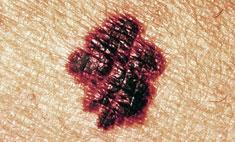摘要:众所周知,恶性黑色素瘤是一种具有化学药物抗性的恶性肿瘤,Ohanna等在该文章中指出抗黑色素瘤药物或许会反常的导致一种与老化相关的分泌剖面,称作“secretome”,最终促进新陈代谢,使黑色素瘤复发。

黑色素瘤
While cellular senescence has been thought of as a natural mechanism to combat uncontrolled cell growth, or cancer, recent studies have shown that some cell types express a secretome during senescence that alters the tumor microenvironment and affects the cell's response to chemotherapeutic drugs. Ohanna et al. confirm that senescent melanoma cells do, in fact, express an inflammatory secretome, and have delineated the genetic pathways involved: Depletion of the MITF transcription factor, or exposure to anti-melanoma drugs, activates the DNA damage response and triggers senescence. Senescent melanoma cells express a PARP-1 and NF-kB—associated secretome, which contains high levels of the chemokine CCL2. CCL2, in turn, leads to a loss of E-cadherin expression and an invasive phenotype.
In fact, Ohanna et al. show that culturing melanoma cells with exogenous CCL2 enhances their survival and invasiveness. This finding suggests that blocking CCL2, or its upstream effectors, may represent a novel therapeutic pathway. As Dr. Bertolotto explains, "Our data disclose a part of the mechanisms contributory to failure of anti-melanoma chemotherapies and we gain valuable insight for the identification of new candidates, namely PARP-1, NF-kB or CCL2, for therapeutic intervention in view to overcome drug resistance."
https://news.biocompare.com/News/NewsStory/379834/Genetics-Of-Melanoma-Chemoresistance.html







